人教版(2019)选择性必修第二册Unit 2 Bridging Cultures Reading and Thinking(共32张PPT,内镶嵌视频)
文档属性
| 名称 | 人教版(2019)选择性必修第二册Unit 2 Bridging Cultures Reading and Thinking(共32张PPT,内镶嵌视频) | 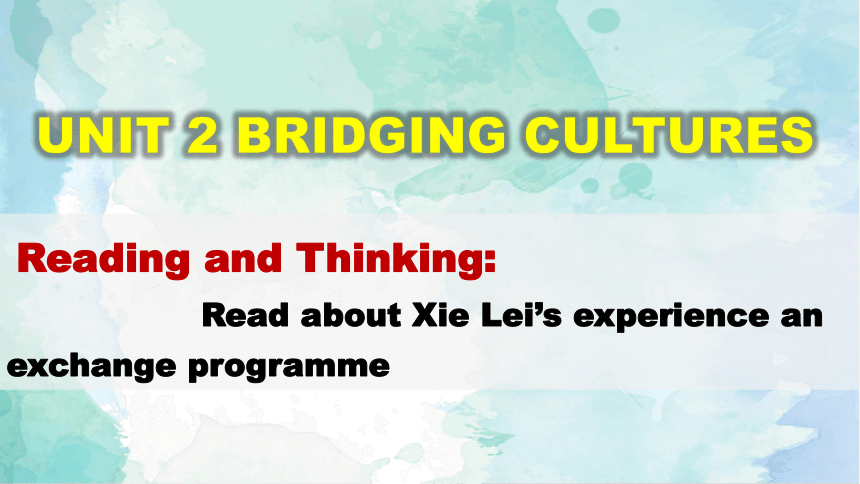 | |
| 格式 | pptx | ||
| 文件大小 | 20.6MB | ||
| 资源类型 | 教案 | ||
| 版本资源 | 人教版(2019) | ||
| 科目 | 英语 | ||
| 更新时间 | 2024-01-31 07:43:03 | ||
图片预览

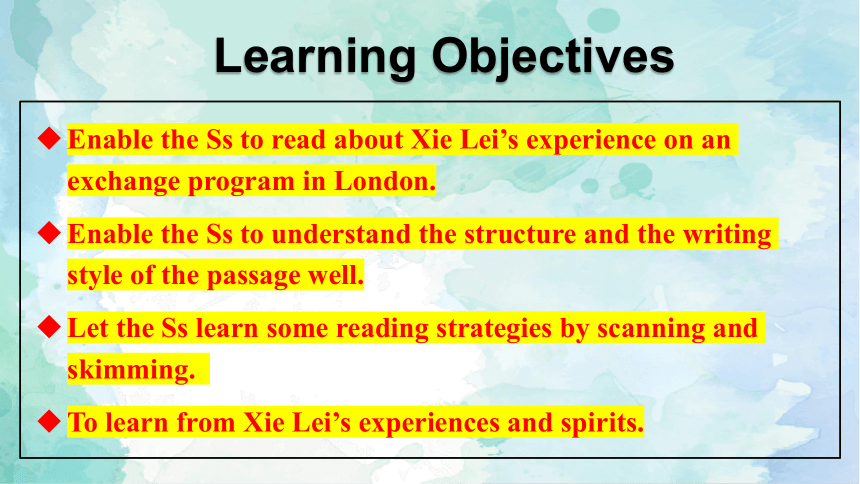

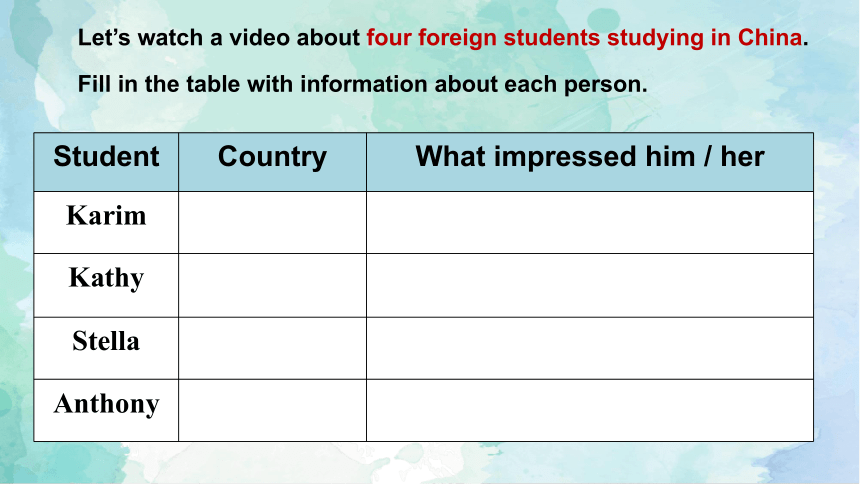

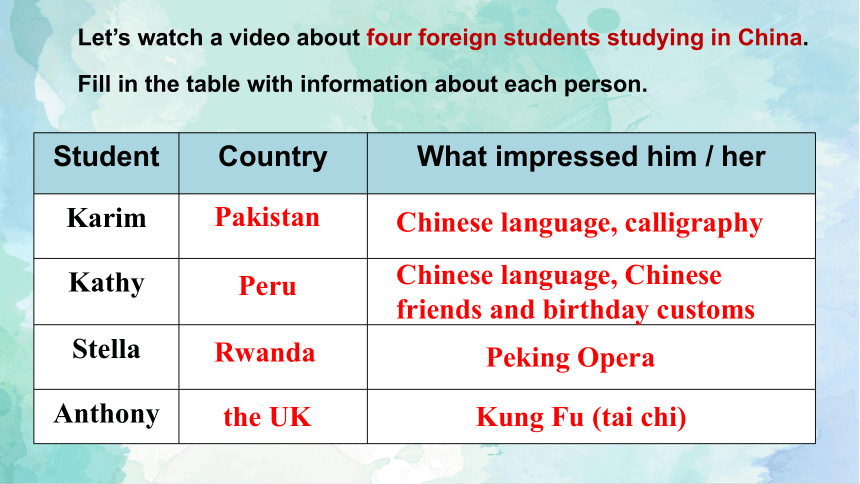

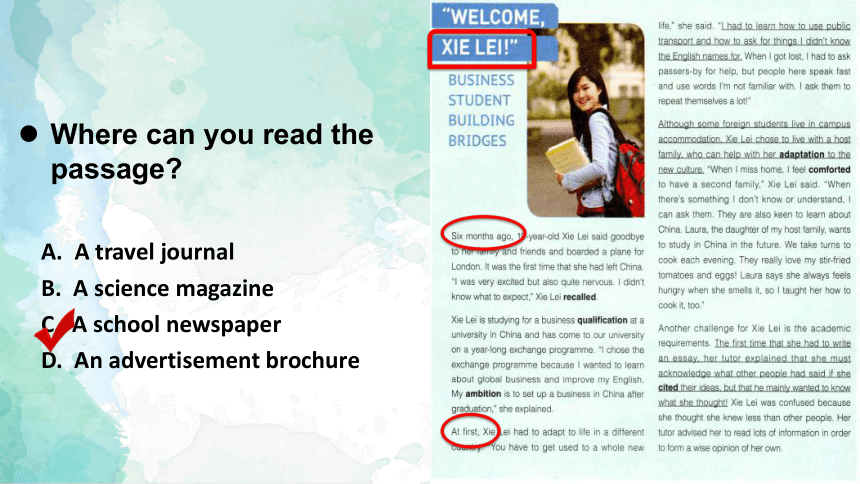

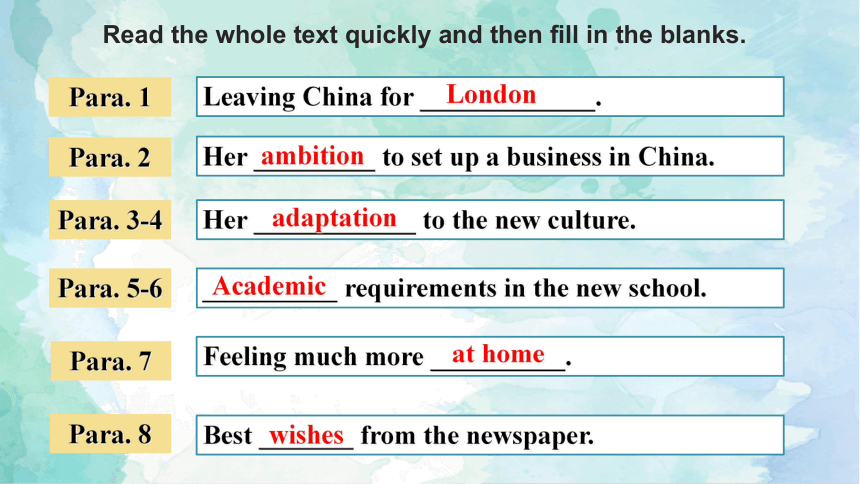
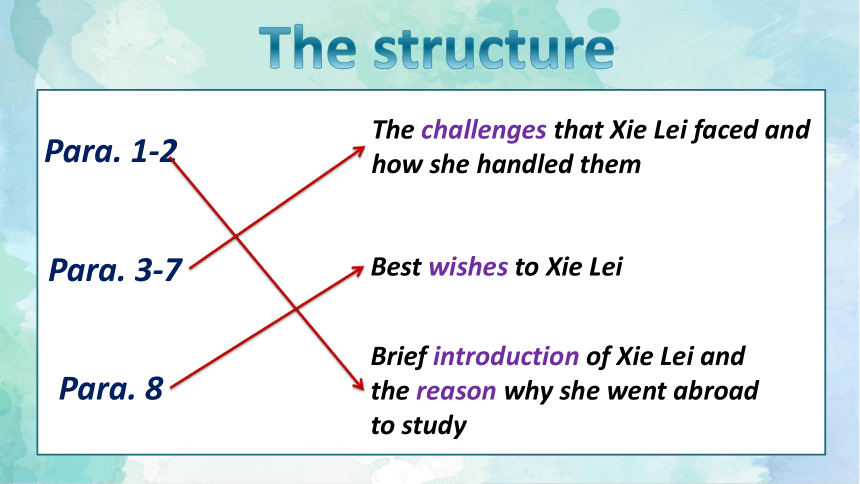
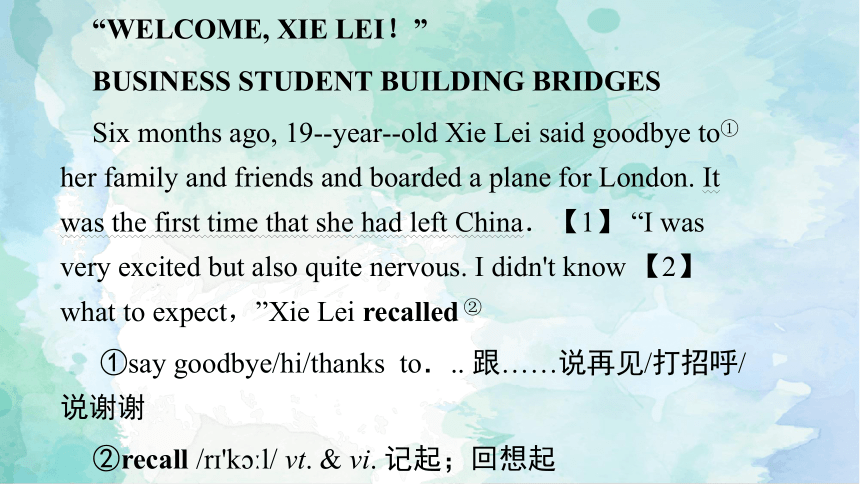
文档简介
(共32张PPT)
UNIT 2 BRIDGING CULTURES
Reading and Thinking:
Read about Xie Lei’s experience an exchange programme
Learning Objectives
Enable the Ss to read about Xie Lei’s experience on an exchange program in London.
Enable the Ss to understand the structure and the writing style of the passage well.
Let the Ss learn some reading strategies by scanning and skimming.
To learn from Xie Lei’s experiences and spirits.
Ⅰ
Pre-reading
Fill in the table with information about each person.
Student Country What impressed him / her
Karim
Kathy
Stella
Anthony
Let’s watch a video about four foreign students studying in China.
Fill in the table with information about each person.
Student Country What impressed him / her
Karim
Kathy
Stella
Anthony
Let’s watch a video about four foreign students studying in China.
Pakistan
Chinese language, calligraphy
Peru
Chinese language, Chinese friends and birthday customs
Rwanda
Peking Opera
the UK
Kung Fu (tai chi)
Think about what it might be like if you study in a place where you've never been.
How will you feel
excited
curious
ambitious
hopeful
longing
unsure
puzzled
lost
confused
shocked
Let’s read a passage about an exchange student and see what happened to her.
Where can you read the passage
A. A travel journal
B. A science magazine
C. A school newspaper
D. An advertisement brochure
Ⅱ
While reading
Read the whole text quickly and then fill in the blanks.
Para. 1
Para. 2
Para. 5-6
Para. 7
__________ requirements in the new school.
Her _________ to set up a business in China.
Leaving China for _____________.
Feeling much more __________.
Her ____________ to the new culture.
Para. 3-4
Best _______ from the newspaper.
Para. 8
London
ambition
adaptation
Academic
wishes
at home
The structure
Para. 1-2
Brief introduction of Xie Lei and the reason why she went abroad to study
Para. 3-7
The challenges that Xie Lei faced and
how she handled them
Para. 8
Best wishes to Xie Lei
“WELCOME, XIE LEI!”
BUSINESS STUDENT BUILDING BRIDGES
Six months ago, 19- year -old Xie Lei said goodbye to① her family and friends and boarded a plane for London. It was the first time that she had left China.【1】 “I was very excited but also quite nervous. I didn't know 【2】 what to expect,”Xie Lei recalled ②
①say goodbye/hi/thanks to... 跟……说再见/打招呼/说谢谢
②recall /r 'k l/ vt. & vi. 记起;回想起
It was the first time that she had left China. (Para.1)
这是她第一次离开中国。
It is the first that I have come to Henan.
It was the last time that I had offered you help unconditionally.
It is high time we (should )do something to improve our environment.
It / This / That is the first / second ... time (that) ... have done ...
It / This / That was the first / second ... time (that) ... had done ...
Important sentences (P14 ~ P15)
It is high time (that) sb( should )do sth
1. This is the first time that I receive your letter.(改错)
2. It was the first time that you studied abroad.(改错)
3. It is the first time that I __________________ (invite)
to attend such an important meeting.
4. It was the second time that she __________ (sing) in public.
5. It is high time you _________(go) to school.
have received
had studied
have been invited
即学即练
had sung
should go
1. I didn’t know what to expect. (Para.1)
2. I had to learn how to use public transport and how to ask for things I didn’t know the English names for. (Para.3)
3. ... I taught her how to cook it, too. (Para.4)
句1、2中“疑问词 + to do ”作宾语
句3中“疑问词 + to do ”作直接宾语
“疑问词 + to do ”在句子中可作主语,宾语,直接宾语,表语
二、Translate the following sentences and point out what kind of the “wh- + to do” act as in the sentence.
1. 在哪里举行会议还没定下来。
2. 我在考虑如何实施这个计划。
Where to hold the meeting has not been decided yet.
I’m thinking of how to carry out this plan.
主语
宾语
即学即练
Important sentences (P14 ~ P15)
3. 她不知道如何去帮助那位老人。
4. 问题是何时开始。
5. 你能告诉我如何更好地学习中文吗?
She didn’t know how to help that old man.
The problems is when to start.
宾语
表语
Could you please tell me how to learn Chinese well
直接宾语
即学即练
Important sentences (P14 ~ P15)
Xie Lei is studying for a business qualification ③ at a university in China and has come to our university on a year- long . ④ exchange programme. “I chose the exchange programme because I wanted to learn about global business and improve my English. My ambition is to ⑤ set up a business in China after graduation,”she explained.
③qualification /n. [C](通过考试或学习课程取得的)资格;学历
academic/professional qualifications 学术/专业资历
qualify vt. & vi. (使)具备资格;(使)合格qualified adj 有资格的,能胜任的 be qualified for
④year- long adj. 持续一年的
⑤set up a business 创业 set up开办;创建
At first, Xie Lei had to adapt to ⑥ life in a different country. “You have to get used to ⑦ a whole new life,” she said. “I had to learn how to use public transport and how to ask for things I didn't know the English names for. When I got lost ⑧, I had to ask passers- by ⑨ for help, but people here speak fast and use words I'm not familiar with ⑩. I ask them to repeat themselves a lot!”
⑥adapt to适应(to是介词)
adaptation / d p'te n/ n. [U]适应;[C]改编本
⑦get/be used to习惯于;适应(to是介词) =be/get accustomed to
⑧get lost =be missing 迷路
⑨passer- by n. [C]过路人;行人passers- by
⑩be familiar with 对 …… 熟悉
Although some foreign students live in campus accommodation , Xie Lei chose to live with a host family , 【3】 who can help with her adaptation to the new culture. “When I miss home, I feel comforted to have a second family,”Xie Lei said. “When there's something 【4】 I don't know or understand, I can ask them. They are also keen to learn about China. Laura, the daughter of my host family, wants to study in China in the future. We take turns to cook each evening. They really love my stir- fried tomatoes and eggs! Laura says she always feels hungry when she smells it, so I taught her how to cook it, too.”
【3】此处是who引导的非限制性定语从句,修饰先行词a host family, who在从句中作主语。
【4】此处是定语从句,修饰先行词something,从句中省略了关系代词that。注:当先行词是something, everything等不定代词时,引导定语从句的关系代词只能用that,不能用which。
campus accommodation 大学宿舍,校内住宿
host family 寄宿家庭
be keen to do sth. 渴望做某事;热衷于做某事.
be keen on sth 渴望某事;热衷于某事
take turns to do sth 轮流做某事
it is one’s turn to do sth轮到某做某事
in turn 依次地;轮流地
stir- fry vt. 翻炒;炒 Stir- fried adj 炒的
Stir- fried tomatoes and eggs 西红柿炒鸡蛋
Another challenge for Xie Lei is the academic requirements The first time that she had to write an essay, her tutor explained that she must acknowledge what other people had said if she citedtheir ideas, but that he mainly wanted to know what she thought!【6】 Xie Lei was confused because she thought she knew less than other people. Her tutor advised her to read lots of information in order to form a wise opinion of her own .
【6】这个句子的主干是“her tutor explained that...”。句首的The first time...是时间状语,其中含有that引导的定语从句,修饰the first time。主句的谓语动词explained后面是两个that引导的宾语从句,第二个宾语从句的连接词that不能省略。
academic requirements
The first time that 中that引导时间状语
less than 少于 more than 多于
advise sb to do sth 建议某人做某事
in order to do sth =so as to do sth=to do sth
作目的状语,为了做某事
form a wise opinion of her own形成属于自己的充满智慧的观点
.The first time that she had to write an essay, her tutor explained that she must acknowledge what other people had said if she cited their ideas, but that he mainly wanted to know what she thought! (Para.5) 她第一次写论文时,导师跟她解释说,如果引用别人的观点就一定要感谢,不过导师主要是想知道她自己是怎么想的!
Think: What’s the meaning of “acknowledge”
It is generally acknowledged that the automobiles make our life convenient.
He acknowledged the greeting with a nod.
I should like to acknowledge all the help I have received from my family.
(公开)感谢
向……打招呼;对……作出反应
承认;认为
Important sentences (P14 ~ P15)
Xie Lei also found many courses included students' participation in class as part of the final result. Students need to generate ideas , offer examples, apply concepts , and raise questions , as well as give presentations . At first, Xie Lei had no idea what she should say, but 【7】 what surprised her was that she found herself speaking up . in class after just a few weeks. “My presentation on traditional Chinese art was a great success, which boosted my confidence ,” she said. “I'll use these skills back home for presentations. They'll help me build a strong business in the future.”
【7】what surprised her是主语从句,what在该从句中作主语;that she found...a few weeks是表语从句。
generate ideas 产生想法 generate /'d en re t/ vt. 产生,引起
apply concepts 运用概念
raise vt. [熟词生义]提及,提出 raise questions 提出问题
presentation n. [C]报告;陈述;介绍 give presentations 进行陈述
speak up 大声说 speak up for支持 赞成
boost /bu st/ vt. 使增长 boost sb.'s confidence 增强某人的信心
build a strong business 建立强大的企业
Now halfway through her exchange year, Xie Lei feels much more at home in the UK. 【8】 What seemed strange before now appears quite normal to her. “Engaging in British culture has helped,”she said. “As well as studying hard, I've been involved in social activities. British people are fascinated by our culture and eager to learn more about it, so I'm keen to share my culture with them. While I'm learning about business, I'm also acting as a cultural messenger building a bridge between us.”
【 8】画线部分是what引导的主语从句,what在从句中作主语。
halfway through 在……中间;在……中途
feel at home 舒服自在,不拘束
appear+形容词 呈现,好像=seem/look
as well as后面通常接名词或动词 ing,意为“除……之外”
be fascinated by... 对……着迷
be eager to do sth. 渴望做某事
act as 担任;扮演
We will follow Xie Lei's progress in later editions, but for now, we wish her all the best.
What are the benefits and difficulties of studying abroad
Help us to be independent
Be easier to learn a foreign language
Broaden our horizons and enrich our knowledge
Learn advanced technology
Have new experiences
Cost a lot of money
Difficult to communicate with others
Lonely and tired to live in a new country
Be homesick and lonely
...
benefits
difficulties
...
I am not the same, having seen the moon shine on the other side of the world.
—Mary Anne Radmacher
在世界的另一端看过月光闪耀,我就不会是同样的自己了。
Homework
Ⅴ
1. 你的英国笔友Bella发电子邮件向你询问来中国留学情况。请你根据以下要点给她回复。
① 欢迎其到中国留学;
② 来中国留学的益处;
③ 来中国留学会遇到的困难与建议。
2. Read ZHAN TIANYOU: THE FATHER OF CHINA’S RAILROAD on Page 73.
Thanks
UNIT 2 BRIDGING CULTURES
Reading and Thinking:
Read about Xie Lei’s experience an exchange programme
Learning Objectives
Enable the Ss to read about Xie Lei’s experience on an exchange program in London.
Enable the Ss to understand the structure and the writing style of the passage well.
Let the Ss learn some reading strategies by scanning and skimming.
To learn from Xie Lei’s experiences and spirits.
Ⅰ
Pre-reading
Fill in the table with information about each person.
Student Country What impressed him / her
Karim
Kathy
Stella
Anthony
Let’s watch a video about four foreign students studying in China.
Fill in the table with information about each person.
Student Country What impressed him / her
Karim
Kathy
Stella
Anthony
Let’s watch a video about four foreign students studying in China.
Pakistan
Chinese language, calligraphy
Peru
Chinese language, Chinese friends and birthday customs
Rwanda
Peking Opera
the UK
Kung Fu (tai chi)
Think about what it might be like if you study in a place where you've never been.
How will you feel
excited
curious
ambitious
hopeful
longing
unsure
puzzled
lost
confused
shocked
Let’s read a passage about an exchange student and see what happened to her.
Where can you read the passage
A. A travel journal
B. A science magazine
C. A school newspaper
D. An advertisement brochure
Ⅱ
While reading
Read the whole text quickly and then fill in the blanks.
Para. 1
Para. 2
Para. 5-6
Para. 7
__________ requirements in the new school.
Her _________ to set up a business in China.
Leaving China for _____________.
Feeling much more __________.
Her ____________ to the new culture.
Para. 3-4
Best _______ from the newspaper.
Para. 8
London
ambition
adaptation
Academic
wishes
at home
The structure
Para. 1-2
Brief introduction of Xie Lei and the reason why she went abroad to study
Para. 3-7
The challenges that Xie Lei faced and
how she handled them
Para. 8
Best wishes to Xie Lei
“WELCOME, XIE LEI!”
BUSINESS STUDENT BUILDING BRIDGES
Six months ago, 19- year -old Xie Lei said goodbye to① her family and friends and boarded a plane for London. It was the first time that she had left China.【1】 “I was very excited but also quite nervous. I didn't know 【2】 what to expect,”Xie Lei recalled ②
①say goodbye/hi/thanks to... 跟……说再见/打招呼/说谢谢
②recall /r 'k l/ vt. & vi. 记起;回想起
It was the first time that she had left China. (Para.1)
这是她第一次离开中国。
It is the first that I have come to Henan.
It was the last time that I had offered you help unconditionally.
It is high time we (should )do something to improve our environment.
It / This / That is the first / second ... time (that) ... have done ...
It / This / That was the first / second ... time (that) ... had done ...
Important sentences (P14 ~ P15)
It is high time (that) sb( should )do sth
1. This is the first time that I receive your letter.(改错)
2. It was the first time that you studied abroad.(改错)
3. It is the first time that I __________________ (invite)
to attend such an important meeting.
4. It was the second time that she __________ (sing) in public.
5. It is high time you _________(go) to school.
have received
had studied
have been invited
即学即练
had sung
should go
1. I didn’t know what to expect. (Para.1)
2. I had to learn how to use public transport and how to ask for things I didn’t know the English names for. (Para.3)
3. ... I taught her how to cook it, too. (Para.4)
句1、2中“疑问词 + to do ”作宾语
句3中“疑问词 + to do ”作直接宾语
“疑问词 + to do ”在句子中可作主语,宾语,直接宾语,表语
二、Translate the following sentences and point out what kind of the “wh- + to do” act as in the sentence.
1. 在哪里举行会议还没定下来。
2. 我在考虑如何实施这个计划。
Where to hold the meeting has not been decided yet.
I’m thinking of how to carry out this plan.
主语
宾语
即学即练
Important sentences (P14 ~ P15)
3. 她不知道如何去帮助那位老人。
4. 问题是何时开始。
5. 你能告诉我如何更好地学习中文吗?
She didn’t know how to help that old man.
The problems is when to start.
宾语
表语
Could you please tell me how to learn Chinese well
直接宾语
即学即练
Important sentences (P14 ~ P15)
Xie Lei is studying for a business qualification ③ at a university in China and has come to our university on a year- long . ④ exchange programme. “I chose the exchange programme because I wanted to learn about global business and improve my English. My ambition is to ⑤ set up a business in China after graduation,”she explained.
③qualification /n. [C](通过考试或学习课程取得的)资格;学历
academic/professional qualifications 学术/专业资历
qualify vt. & vi. (使)具备资格;(使)合格qualified adj 有资格的,能胜任的 be qualified for
④year- long adj. 持续一年的
⑤set up a business 创业 set up开办;创建
At first, Xie Lei had to adapt to ⑥ life in a different country. “You have to get used to ⑦ a whole new life,” she said. “I had to learn how to use public transport and how to ask for things I didn't know the English names for. When I got lost ⑧, I had to ask passers- by ⑨ for help, but people here speak fast and use words I'm not familiar with ⑩. I ask them to repeat themselves a lot!”
⑥adapt to适应(to是介词)
adaptation / d p'te n/ n. [U]适应;[C]改编本
⑦get/be used to习惯于;适应(to是介词) =be/get accustomed to
⑧get lost =be missing 迷路
⑨passer- by n. [C]过路人;行人passers- by
⑩be familiar with 对 …… 熟悉
Although some foreign students live in campus accommodation , Xie Lei chose to live with a host family , 【3】 who can help with her adaptation to the new culture. “When I miss home, I feel comforted to have a second family,”Xie Lei said. “When there's something 【4】 I don't know or understand, I can ask them. They are also keen to learn about China. Laura, the daughter of my host family, wants to study in China in the future. We take turns to cook each evening. They really love my stir- fried tomatoes and eggs! Laura says she always feels hungry when she smells it, so I taught her how to cook it, too.”
【3】此处是who引导的非限制性定语从句,修饰先行词a host family, who在从句中作主语。
【4】此处是定语从句,修饰先行词something,从句中省略了关系代词that。注:当先行词是something, everything等不定代词时,引导定语从句的关系代词只能用that,不能用which。
campus accommodation 大学宿舍,校内住宿
host family 寄宿家庭
be keen to do sth. 渴望做某事;热衷于做某事.
be keen on sth 渴望某事;热衷于某事
take turns to do sth 轮流做某事
it is one’s turn to do sth轮到某做某事
in turn 依次地;轮流地
stir- fry vt. 翻炒;炒 Stir- fried adj 炒的
Stir- fried tomatoes and eggs 西红柿炒鸡蛋
Another challenge for Xie Lei is the academic requirements The first time that she had to write an essay, her tutor explained that she must acknowledge what other people had said if she citedtheir ideas, but that he mainly wanted to know what she thought!【6】 Xie Lei was confused because she thought she knew less than other people. Her tutor advised her to read lots of information in order to form a wise opinion of her own .
【6】这个句子的主干是“her tutor explained that...”。句首的The first time...是时间状语,其中含有that引导的定语从句,修饰the first time。主句的谓语动词explained后面是两个that引导的宾语从句,第二个宾语从句的连接词that不能省略。
academic requirements
The first time that 中that引导时间状语
less than 少于 more than 多于
advise sb to do sth 建议某人做某事
in order to do sth =so as to do sth=to do sth
作目的状语,为了做某事
form a wise opinion of her own形成属于自己的充满智慧的观点
.The first time that she had to write an essay, her tutor explained that she must acknowledge what other people had said if she cited their ideas, but that he mainly wanted to know what she thought! (Para.5) 她第一次写论文时,导师跟她解释说,如果引用别人的观点就一定要感谢,不过导师主要是想知道她自己是怎么想的!
Think: What’s the meaning of “acknowledge”
It is generally acknowledged that the automobiles make our life convenient.
He acknowledged the greeting with a nod.
I should like to acknowledge all the help I have received from my family.
(公开)感谢
向……打招呼;对……作出反应
承认;认为
Important sentences (P14 ~ P15)
Xie Lei also found many courses included students' participation in class as part of the final result. Students need to generate ideas , offer examples, apply concepts , and raise questions , as well as give presentations . At first, Xie Lei had no idea what she should say, but 【7】 what surprised her was that she found herself speaking up . in class after just a few weeks. “My presentation on traditional Chinese art was a great success, which boosted my confidence ,” she said. “I'll use these skills back home for presentations. They'll help me build a strong business in the future.”
【7】what surprised her是主语从句,what在该从句中作主语;that she found...a few weeks是表语从句。
generate ideas 产生想法 generate /'d en re t/ vt. 产生,引起
apply concepts 运用概念
raise vt. [熟词生义]提及,提出 raise questions 提出问题
presentation n. [C]报告;陈述;介绍 give presentations 进行陈述
speak up 大声说 speak up for支持 赞成
boost /bu st/ vt. 使增长 boost sb.'s confidence 增强某人的信心
build a strong business 建立强大的企业
Now halfway through her exchange year, Xie Lei feels much more at home in the UK. 【8】 What seemed strange before now appears quite normal to her. “Engaging in British culture has helped,”she said. “As well as studying hard, I've been involved in social activities. British people are fascinated by our culture and eager to learn more about it, so I'm keen to share my culture with them. While I'm learning about business, I'm also acting as a cultural messenger building a bridge between us.”
【 8】画线部分是what引导的主语从句,what在从句中作主语。
halfway through 在……中间;在……中途
feel at home 舒服自在,不拘束
appear+形容词 呈现,好像=seem/look
as well as后面通常接名词或动词 ing,意为“除……之外”
be fascinated by... 对……着迷
be eager to do sth. 渴望做某事
act as 担任;扮演
We will follow Xie Lei's progress in later editions, but for now, we wish her all the best.
What are the benefits and difficulties of studying abroad
Help us to be independent
Be easier to learn a foreign language
Broaden our horizons and enrich our knowledge
Learn advanced technology
Have new experiences
Cost a lot of money
Difficult to communicate with others
Lonely and tired to live in a new country
Be homesick and lonely
...
benefits
difficulties
...
I am not the same, having seen the moon shine on the other side of the world.
—Mary Anne Radmacher
在世界的另一端看过月光闪耀,我就不会是同样的自己了。
Homework
Ⅴ
1. 你的英国笔友Bella发电子邮件向你询问来中国留学情况。请你根据以下要点给她回复。
① 欢迎其到中国留学;
② 来中国留学的益处;
③ 来中国留学会遇到的困难与建议。
2. Read ZHAN TIANYOU: THE FATHER OF CHINA’S RAILROAD on Page 73.
Thanks
